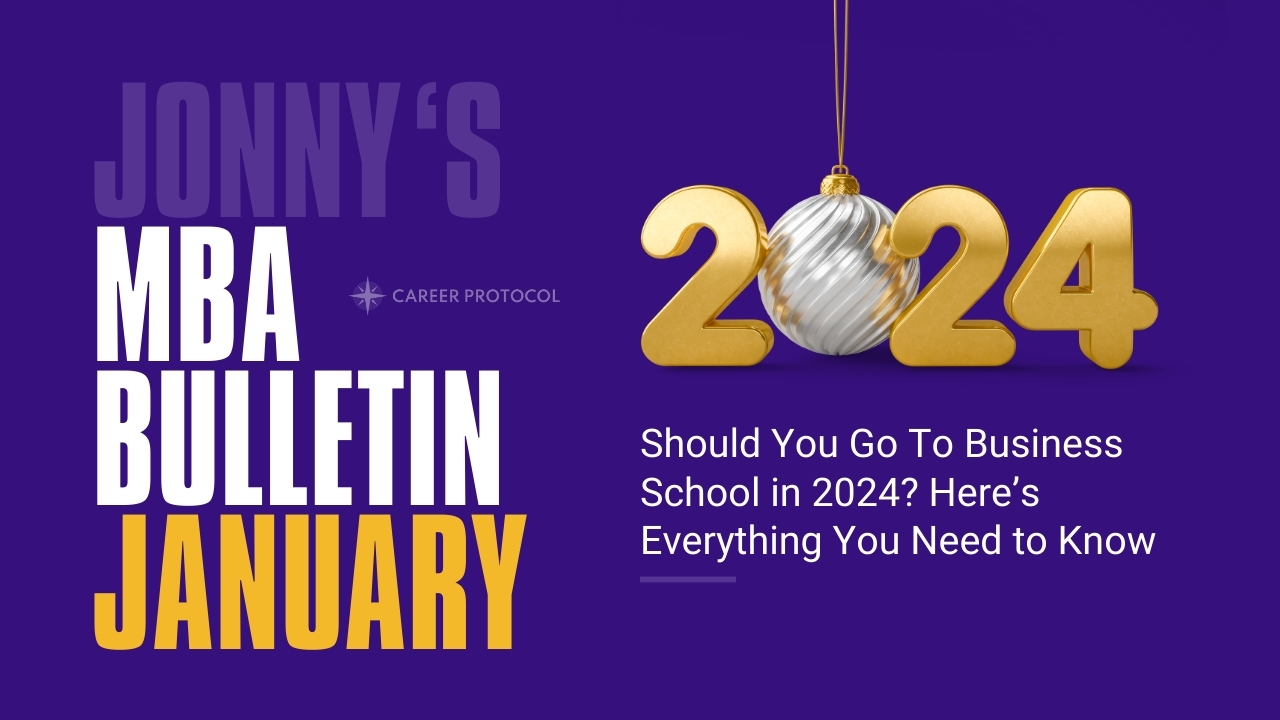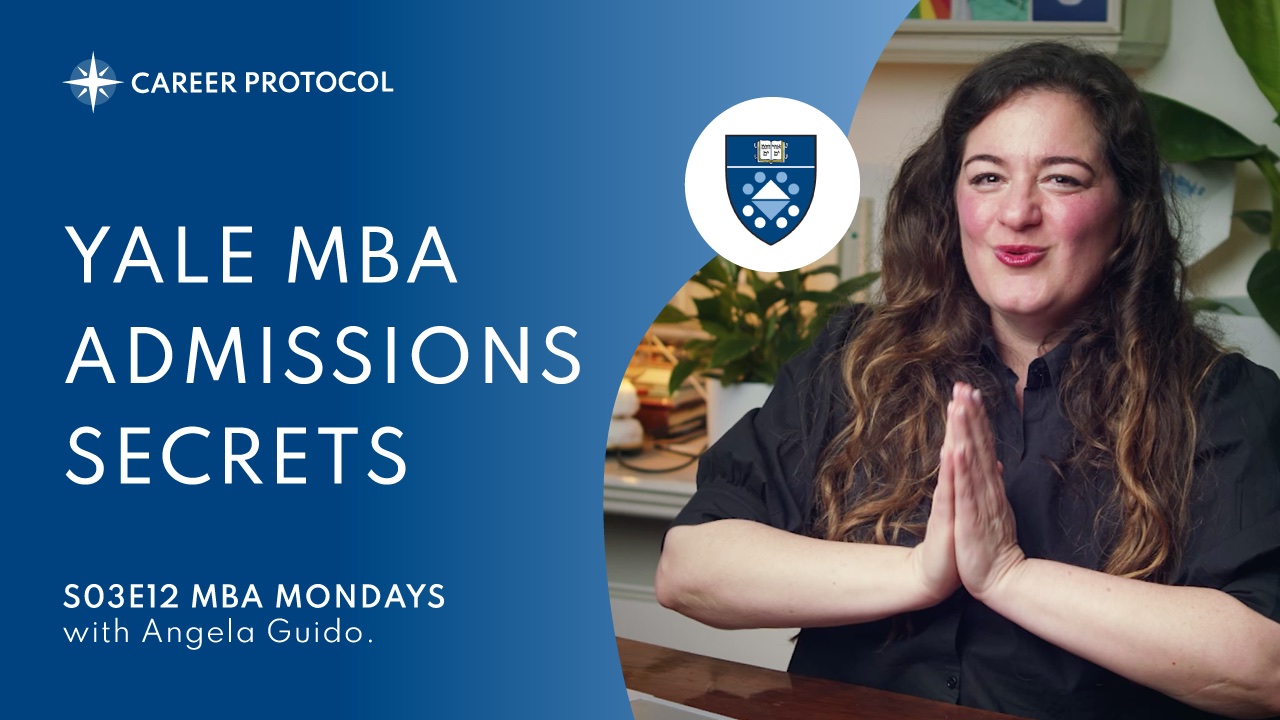But more than that, Yale SOM is driven by some very unique and proven principals that set it apart from other MBA programs. To find out what they are, and how they affect your admissions strategy, Angela Guido is joined by Career Protocol’s research extraordinaire Louise Loeb to let us in on what makes Yale’s business school so special.
Itching to know more?
Check out our crazy long page with all the information you could ever need

Prefer to read? Here’s the transcript:
Welcome back to MBA Monday. I'm Angela Guido, the founder of Career Protocol. I am an MBA Coach. I am a Career Coach. And me and my whole team are here to help you. Me? Who says me? I and my whole team are here to help you be successful on your MBA journey and achieve your career dreams. It's a little-known fact that at Career Protocol, on the back end of our process, even though we work one on one with clients, on the back end, we truly work as a team. We collaborate, we share information, we're on Slack at all hours of the day, sharing insights with each other about schools and about clients. We love what we do and we love helping you be successful. Today we're talking about the Yale MBA program and why it's so special. Now, I went to Yale College, but I thought since we're talking about SOM you'd much rather hear from our school specialist, researcher, and expert Louise Loeb. She's here to tell you what makes Yale so special.
Louise: Hi, I'm Louise Loeb. I'm a Senior Instructor at Career Protocol.
1. The Integrated Core Curriculum
AG: Now, I know that you could talk for hours about what makes Yale so awesome because I know that all of your clients who've gotten into Yale, which is not a small number of people, have loved that program. But let me ask you to lead with just three things. Let's see if we can do three things about Yale that make it a really unique and special MBA program.
LL: So, yeah, three things that make the Yale SOM MBA program really special. One, I really love their integrated core curriculum for first-year MBAs. A lot of MBA programs have a core curriculum, but what makes Yale different is that they have a very multidisciplinary approach to the MBA education because of their mission to educate leaders for business and society. So Yale really encourages students to take electives across the university, other schools, and in the first year core curriculum, the courses aren't based on siloed disciplines. Rather, the core curriculum focuses on teaching business concepts and fundamentals through the perspective of organizational stakeholders. So you can take a class on competitor, customer, investor, innovator, executive, instead of just marketing or finance, et cetera.
2. The Raw Case Method Approach
AG: That's truly unique. If you look across the various MBA programs, there's really no one that is teaching business from such a multidimensional, multifaceted, cross-disciplinary perspective. So what's your advice to students who are considering Yale for their MBA and, in particular, how they need to think about school research and the application process given that Yale has this very special curriculum?
LL: I would say to really talk to current students and alumni from the Yale SOM program. They are the best resources to get an inside glimpse of what the culture and vibe of the community is, as well as first-hand experience of what it's like to take those classes, especially using the raw case method approach which Yale SOM champions, which is different from schools that use the case method approach like HBS or Darden, Yale actually throws a lot of raw information and data at their MBA students instead of neatly packaging case studies in a 10 to 15-page narrative with just the right amount of data for that class. The raw case method approach at SOM really forces MBA students to sift through a lot of information and data in order to find out which of that information is relevant for that day's lesson. And that really mimics what business leaders have to encounter in the real world where they don't get a neatly packaged case telling them which data is relevant, they really have to make those decisions on their own in the moment.
3. Purpose-Driven Leadership
AG: That's really incredible. They're truly simulating what it's like to be a business leader, to be a manager, and to have to make decisions under uncertainty with incomplete and frankly, too much information. I mean, actually, as a management consultant, I remember the problem was always not enough data, but as a business leader, as a business owner, our problem is 100% too much data. Like, we don't actually even know what to look at to make the decisions that we're making. So now I'm wondering maybe I need to go back and get a Yale MBA to get ready to make business decisions with too much information. So very cool. There were a couple of other things that I know that you really love about Yale. So, any last, favorite comments about what makes the Yale MBA special?
LL: Yeah. So Yale really draws purpose-driven leaders. In the MBA admissions essay, they ask you what is your biggest commitment that you've made in your life? And that's really to find people who are really passionate about certain causes in their life, whether it's sustainability, women's empowerment, working for nonprofit management. Yale is really great, has really great programs in sustainability and nonprofit management and tends to draw people with an interest in things beyond business, but that actually impacts society. Interestingly, SOM also admits a significant number of applicants from humanities backgrounds, a little bit more than other MBA programs, and they also admit a lot of students or a significant percentage of students from nonprofit backgrounds. And as a result, the average work years of experience tends to be a little bit on the lower end. For some, that would be 4.4 years rather than the traditional 5 or 6 years at other MBA programs.
Could Yale Be A Great MBA Program For You?
AG: It's amazing. We talk a lot about how the rankings are a really imperfect measure of the differences among MBA programs and which schools are going to be best for which people, and these facts about Yale really show what a truly distinctive and unique program it is versus all of the other schools that frequently top the rankings. So, Louise, one last question for you. As you coach your clients and you help them choose the schools that are right for them, what are the types of people that you most recommend? Yale to. In other words, for the people watching MBA Monday, who should self-select into the Yale MBA as the right school for them?
LL: So because SOM has really strong resources for sustainability and nonprofit management, applicants who have strong backgrounds and passions for environmental protection, business, environmental sustainability, and nonprofit management social impact should definitely take a look at the MBA program. And also students from arts and humanities would also really enjoy the Yale MBA program because of its multidisciplinary focus and breath. SOM is also a consortium member school.
AG: Little pitch for the consortium. We don't talk much about that, but we do a lot of work with applicants through the consortium. Be sure to sign up for a free MBA strategy call if you want to talk directly with Louise about your MBA dreams, about Yale, about the consortium and about who you are and what you hope to become. Thank you so much, Louise. This was incredibly helpful. I know the MBA Monday audience really appreciate your time. We have the best team. You all. Thanks. Thanks, Louise. See you next week!
Sign up for a free MBA strategy call right here:
Free Strategy Call

Angela Guido
Student of Human Nature| Founder and
Chief Education Officer of Career Protocol
Check out the Ultimate Guide How to Get Into Business School
Get our Comprehensive MBA Career Report

The highest quality MBA resources you’ll find this month. (Jonny’s MBA Bulletin, March 2024)

The highest quality MBA resources you’ll find this month. (Jonny’s MBA Bulletin, February 2024)

The highest quality MBA resources you’ll find this month. (Jonny’s MBA Bulletin, January 2024)

